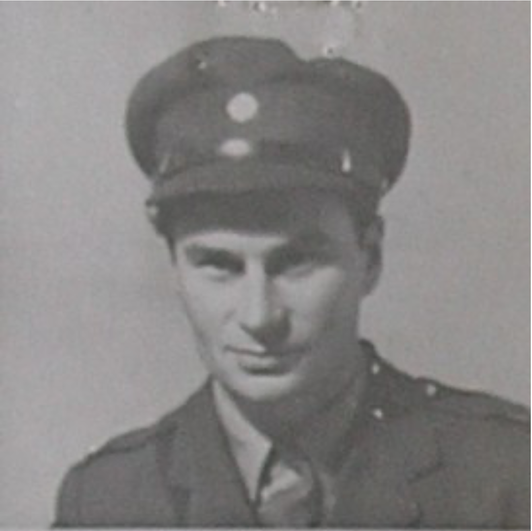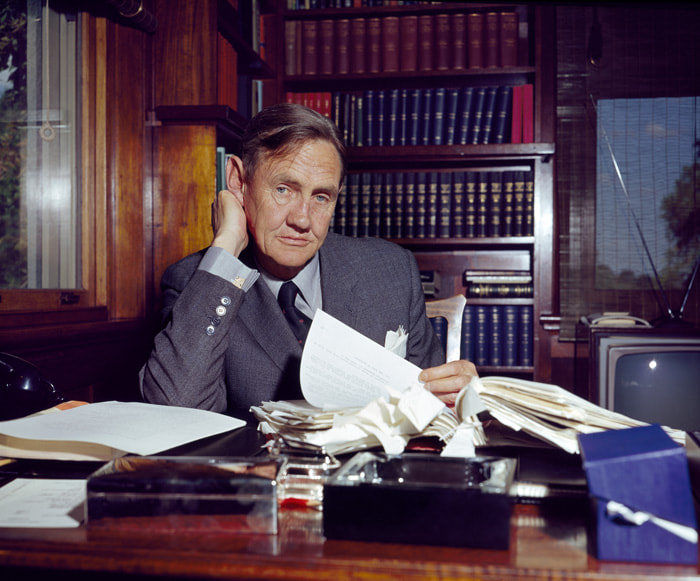How BNCBC helped save Sterling
Rupert Raw, photo taken from his S.O.E. file
by William O'Chee
While the Boat Club’s 205 year history is resplendent with many tales of rowing glory, its men and women have made their mark in many other ways as well. Little known, but enthralling, is the story of how the Boat Club saved sterling in the late 1960s.
The antecedents of this story go back to the 1930s, and two successive Boat Club Captains, Rupert Raw, and John Gorton. The two men came from very different backgrounds but both were at home in the inclusive spirit which pervaded the Boat Club.
Raw’s father, himself a Brasenose man, had been an officer in the Northumberland Fusiliers when he was killed at Gallipoli in 1915, and the young Rupert was only three years of age. His mother married again to Sir William Stuart-Menteth Bt, and Rupert attended Eton, where he stroked their 1st VIII in the Ladies Plate at Henley before going up to B.N.C. in 1930.
On the other side of the world, John Gorton had been born out of wedlock. His father had previously been married but separated, and the wife refused him a divorce. Gorton's mother died when John was eight, and he was sent to live with his father’s first wife. He later attended Geelong Grammar School before spending a year working on a farming property his father owned. His father took a second mortgage on the farm to enable Gorton to go up to Brasenose, arriving in Michaelmas Term of 1932. He found the College was social, and overwhelmingly hearty, although it found room too for dramatics and more intellectual pursuits, without any rancour.
Raw and Gorton first rowed together for Brasenose in 1932 when they won the O.U.B.C. Fours. Gorton rowed in three and Raw in two, alongside W.E. Bruce in bow and O.U.B.C. President Dick Holdsworth at stroke. This crew defeated Wadham, then Exeter and Worcester, before a convincing win against Christ Church in the semi-final. Their final against Oriel was decided in B.N.C.’s favour by five seconds.
The following term Gorton stroked the 1st Torpid, and they combined again in the 1933 Childe of Hale crew. Rupert Raw was elected Boat Club Captain in 1933, and Gorton the Secretary, before Raw handed the Captaincy to Gorton the following year. The two men had strikingly different personalities, however. Raw was unfailingly charming, and a consummate insider. Gorton was brash, with a disdain for rules which extended to marrying an under aged bride (the sister of a College friend) with the permission of neither her mother nor the College.
After both left B.N.C., Gorton went back to the family farm before joining the Royal Australian Air Force in 1940, flying Hurricanes and Kittyhawks against the Japanese. He had an unfortunate war. He suffered an engine failure during a dogfight near Singapore and crash landed, suffering disfiguring facial injuries. He was then sent back to Australia, but the ship he was on was torpedoed, and he and others had to take to a lifeboat before being rescued by the Royal Australian Navy the following day. After service in Papua New Guinea, he was elected to the Australian Senate in 1950, rising to be Liberal Party Leader in the Senate. After the disappearance of Harold Holt in December 1967, Gorton became Prime Minister the following month.
While the Boat Club’s 205 year history is resplendent with many tales of rowing glory, its men and women have made their mark in many other ways as well. Little known, but enthralling, is the story of how the Boat Club saved sterling in the late 1960s.
The antecedents of this story go back to the 1930s, and two successive Boat Club Captains, Rupert Raw, and John Gorton. The two men came from very different backgrounds but both were at home in the inclusive spirit which pervaded the Boat Club.
Raw’s father, himself a Brasenose man, had been an officer in the Northumberland Fusiliers when he was killed at Gallipoli in 1915, and the young Rupert was only three years of age. His mother married again to Sir William Stuart-Menteth Bt, and Rupert attended Eton, where he stroked their 1st VIII in the Ladies Plate at Henley before going up to B.N.C. in 1930.
On the other side of the world, John Gorton had been born out of wedlock. His father had previously been married but separated, and the wife refused him a divorce. Gorton's mother died when John was eight, and he was sent to live with his father’s first wife. He later attended Geelong Grammar School before spending a year working on a farming property his father owned. His father took a second mortgage on the farm to enable Gorton to go up to Brasenose, arriving in Michaelmas Term of 1932. He found the College was social, and overwhelmingly hearty, although it found room too for dramatics and more intellectual pursuits, without any rancour.
Raw and Gorton first rowed together for Brasenose in 1932 when they won the O.U.B.C. Fours. Gorton rowed in three and Raw in two, alongside W.E. Bruce in bow and O.U.B.C. President Dick Holdsworth at stroke. This crew defeated Wadham, then Exeter and Worcester, before a convincing win against Christ Church in the semi-final. Their final against Oriel was decided in B.N.C.’s favour by five seconds.
The following term Gorton stroked the 1st Torpid, and they combined again in the 1933 Childe of Hale crew. Rupert Raw was elected Boat Club Captain in 1933, and Gorton the Secretary, before Raw handed the Captaincy to Gorton the following year. The two men had strikingly different personalities, however. Raw was unfailingly charming, and a consummate insider. Gorton was brash, with a disdain for rules which extended to marrying an under aged bride (the sister of a College friend) with the permission of neither her mother nor the College.
After both left B.N.C., Gorton went back to the family farm before joining the Royal Australian Air Force in 1940, flying Hurricanes and Kittyhawks against the Japanese. He had an unfortunate war. He suffered an engine failure during a dogfight near Singapore and crash landed, suffering disfiguring facial injuries. He was then sent back to Australia, but the ship he was on was torpedoed, and he and others had to take to a lifeboat before being rescued by the Royal Australian Navy the following day. After service in Papua New Guinea, he was elected to the Australian Senate in 1950, rising to be Liberal Party Leader in the Senate. After the disappearance of Harold Holt in December 1967, Gorton became Prime Minister the following month.
John Gorton as Australian Prime Minister in 1968

